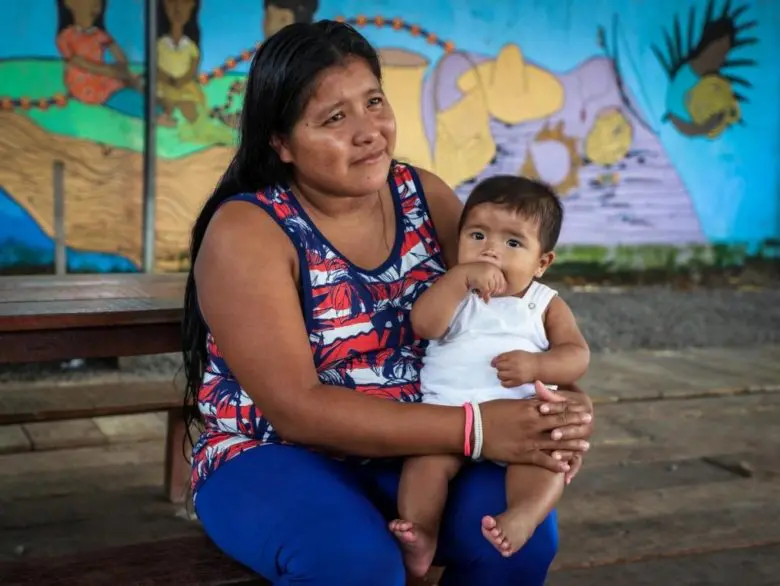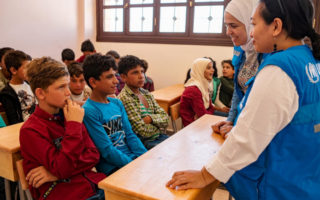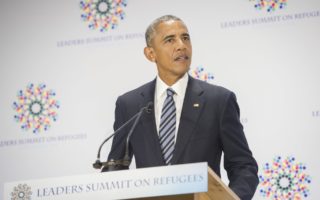
An indigenous Warao mother and child from Venezuela pictured at the Pintolandia shelter, Boa Vista, Brazil, July 2020. © UNHCR/Lucas Novaes
Donor governments today pledged a record US$932 million to UNHCR, the UN Refugee Agency, for next year’s activities at its annual pledging conference in Geneva. These generous initial pledges will allow UNHCR to continue to deliver life-saving aid and to protect the rights of nearly 80 million refugees, displaced and stateless people from the start of 2021. In all, donors have committed over $1.1 billion for UNHCR’s programmes in 2021 and beyond, showing strong solidarity with refugees and confidence in UNHCR’s work.
Addressing the conference, UN High Commissioner for Refugees Filippo Grandi, who just returned from Afghanistan and Sudan, said: “Refugees fleeing conflict, persecution and human rights violations need our support now more than ever. We are encouraged by the commitments our donors made today which are a lifeline for millions needing help, hope and home.”
In order to fulfill its mandated responsibilities and meet critical humanitarian needs in 2021, UNHCR needs US$9.070 billion. This includes US$8.616 billion for its 2021 Global Appeal, and another US$455 million in additional needs for its COVID-19-related activities.
Key needs outlined in UNHCR’s 2021 Global Appeal cover operations in 135 countries, many of them old and new crises and conflicts forcing people to flee. Recent examples include UNHCR’s emergency response for Ethiopian refugees fleeing to eastern Sudan. In the Sahel, millions of refugees and internally displaced live in dire conditions in what is one of the most complex regional crises globally. Hundreds of thousands are fleeing brutal violence in northern Mozambique. The continuing war in Yemen is inflicting a catastrophic toll on civilians, many of them displaced. In Europe, a reignited, decades-old conflict between Armenia and Azerbaijan caused further displacement of civilians. In Latin America, tens of thousands of Nicaraguans have fled a grave crisis resulting in violence and human rights abuses.
In response to these and other crises, UNHCR key activities in 2021 focus on refugee and child protection, emergency preparedness and core relief items for urgent deployment, cash assistance for the most vulnerable, health and food security, water and sanitation and nutrition support, shelter, education, livelihoods, clean energy and environmental protection as well as support for stateless people.
The already challenging global refugee and humanitarian crisis has been worsened dramatically in 2020 by the COVID-19 pandemic. So far, the inclusion of refugees in national public health responses and the work of UNHCR and other aid agencies has helped to keep transmission rates amongst refugees at around the same level as those in host communities.
“These men, women and children cannot be left behind and we cannot allow the pandemic to distract us from meeting their growing needs while searching for solutions to their plight,” said Filippo Grandi, the UN High Commissioner for Refugees. “UNHCR appeals in the most urgent terms for those with means to continue to support the humanitarian response around the world.”
The coronavirus is having a devastating impact on millions of refugees, more than 85 per cent of whom are hosted by developing nations now grappling with the severe economic impact of the pandemic. Refugees face the loss of livelihoods, spiraling destitution and insufficient aid. They cannot feed their families or keep warm in winter. Some are evicted from their shelters. Others are driven to selling their bodies or marrying off their children, falling prey to abuse and exploitation. The most desperate descend to self-harm or worse in some cases – take their own lives. Unable to survive, some refugees are also returning prematurely to situations of conflict and danger.
Consequently, UNHCR is reiterating its calls for full inclusion of forcibly displaced people in all national responses to the pandemic – from health responses to access to vaccines to social safety nets.
Voluntary contributions make up almost the entirety of UNHCR’s funding. In addition to today’s pledges from donor governments, and in a sign of the growing diversification of support for the refugee cause, representatives of UNHCR’s Private Sector National Partners announced their initial and unprecedented commitment of US$275 million for 2021.
UNHCR is grateful for all the contributions received, particularly those providing flexible funding and multi-year support, which are essential to the organization’s ability to respond quickly to new crises and address the needs of the forcibly displaced and their hosts.
Later this month, the UN Refugee Agency will be marking seven decades of humanitarian work for which it has been twice awarded the Nobel Peace Prize – in 1954 and in 1981.
Originally published by UNHCR on 2 December 2020.





